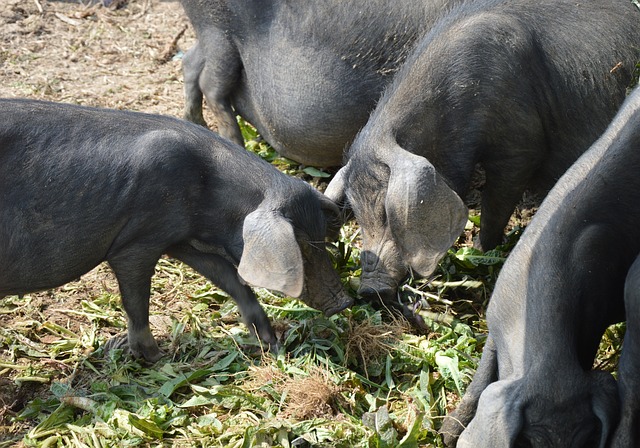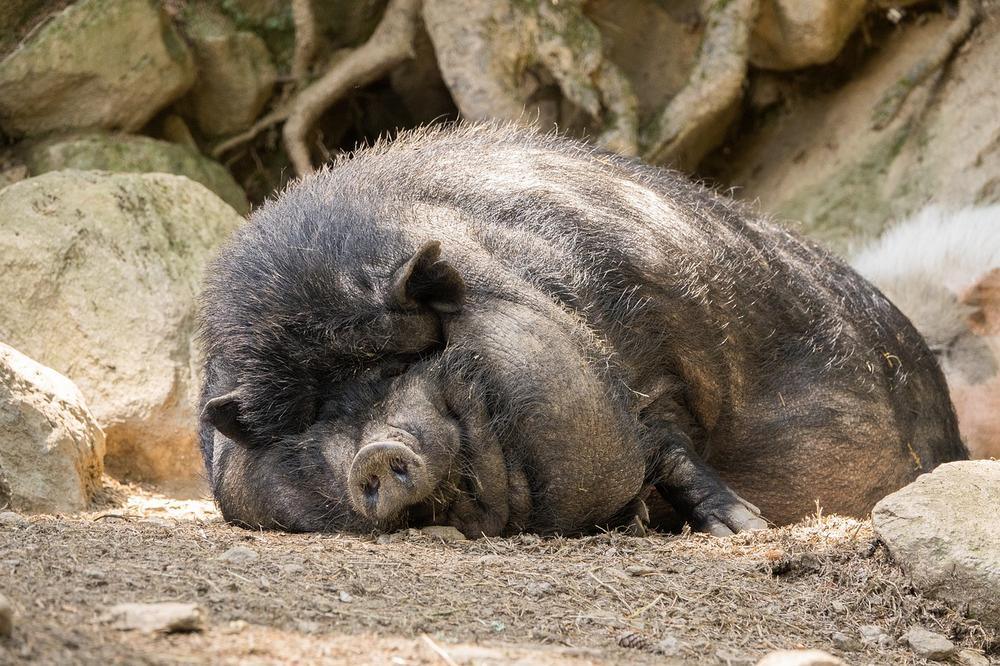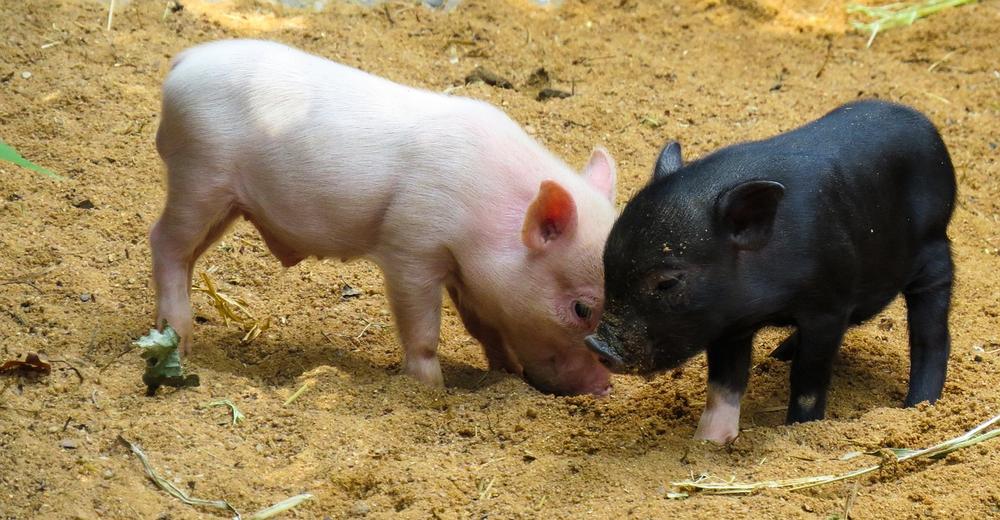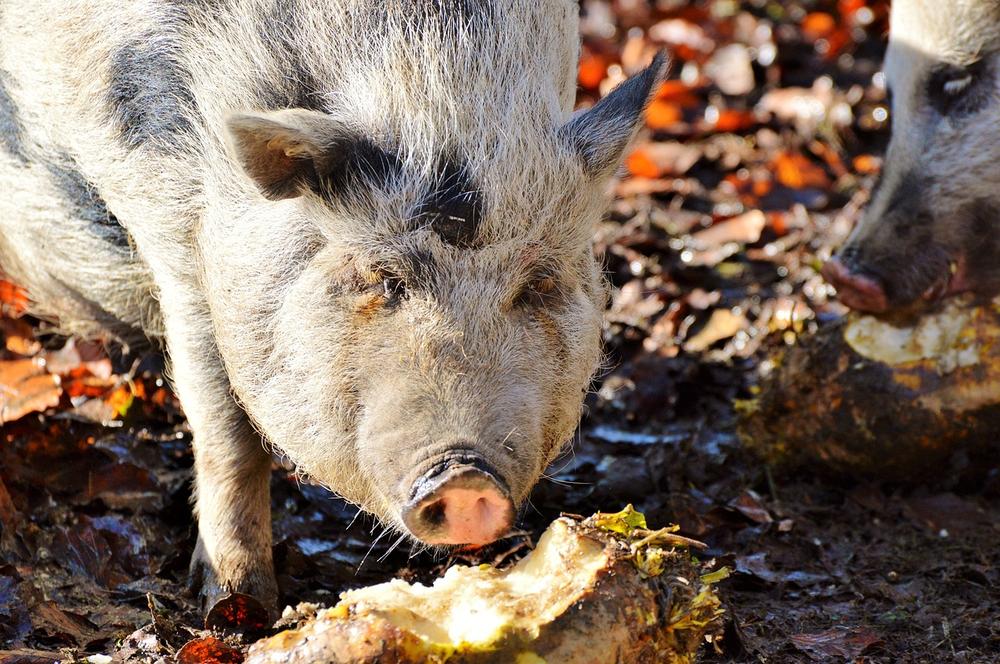Can Pigs Overeat? (And What Should You Do When It Happens)

Ever wondered if a pig can overeat?
Worried sick about your piggy’s health?
The thought of them stuffing their snouts sounds alarming, doesn’t it?
You might be thinking, “How can they even control themselves?” Well, let’s dive into this porcine predicament together. 😱
Let's explore if a pig can truly overindulge and what to do in such a ham-filled situation.
Let the piggy playtime begin.
Can Pigs Overeat?
Can pigs overeat?
Here's what you need to know:
- Feeder pigs have a natural ability to regulate their food intake and avoid overeating, which is pretty impressive.
- However, you need to note that adult pigs can overeat, especially if their feed intake isn't monitored closely.
- Overeating can lead to health issues and obesity in pigs, just like it can in humans. We all need to watch our portions!
- Pigs are unique because they are omnivores, which means they can eat both meat and plants. They're not picky eaters.
- These intelligent animals are known for their ability to handle large quantities of food. They have some serious appetites!
- Feeding pigs too much can be harmful, so you should pay attention to their hunger cues and adjust their food accordingly.
- Please bear in mind that feeder pigs wag their tails when they're happy and content. It's their way of saying "I'm full!"
- To ensure the health of your pigs, provide them with a balanced diet that meets their nutritional needs. Don't overdo it.
- Observe your pigs closely and ensure they are maintaining a healthy weight. If they start gaining too much, it's time to adjust their feeding routine.
- Lastly, remember that while feeder pigs are good at self-regulating, adult pig care requires a bit more monitoring. Stay vigilant.
So, yes, pigs can overeat if we're not careful. Let's keep an eye on their food intake and ensure they stay healthy.
Main points I'll expand upon further down this article:
- Overfeeding pigs can lead to negative health consequences, such as joint and heart issues.
- Excessive fat instead of muscle growth can occur from overeating.
- Overweight or obese pigs can struggle to walk and are at higher risk of joint and heart problems.
- Excess fat around the heart can lead to congestive heart failure.
- Pigs with excessive fat around the chest and neck may have breathing difficulties.
- Monitoring the pig's weight and consulting professionals is important for a safe weight-loss plan.
- Overfeeding breeding stock pigs can result in fertility problems and complications during farrowing.
- Consult with a veterinarian or livestock nutritionist if your pig is overeating.
- Understanding a pig's nutritional needs and observing their eating habits is crucial to prevent overfeeding.
- Introduce treats and supplementary foods in moderation, considering their specific dietary requirements and feed plan.
Now, you're probably wondering what specific negative consequences overfeeding can have on the health of pigs.
Trust me, it's not pretty.
Joint problems, difficulty breathing, excessive fat, and even heart issues...
Want to know the best part?
Keep reading to find out how these consequences can impact your pig's well-being...
Consequences of Overfeeding Pigs
Overfeeding can lead to health issues
Let's talk about overfeeding pigs, shall we?
When you give a pig more food than it actually needs, it can have some serious consequences on its health.
The pig's digestive system has this interesting mechanism where it filters toxins and stores them as fat.
Now, this may sound harmless, but the truth is that it can cause some problems for our porcine friends.
You see, when a pig is overfed, instead of building muscle, excessive fat starts accumulating.
And all that extra weight puts tremendous pressure on their joints, causing quite some pain.
It doesn't stop there, though. Overfeeding can even make it harder for pigs to breathe.
Yes, you heard me right.
They might start wheezing and struggling for air.
Definitely not a pleasant situation for anyone involved.
Age matters when it comes to overfeeding
Now, here's an interesting fact for you:
The age and life stage of the pig can affect just how bad the consequences of overfeeding are.
If a pig happens to be overweight or obese, well, it may have difficulty walking or moving comfortably.

Imagine being stuck with all that extra weight dragging you down. Not a pretty picture, right?
But it doesn't end there.
Overfeeding can mess with a pig's heart. Yes, it truly can. The fatty deposits around the heart make it increasingly difficult for the blood to flow properly.
That's what we call congestive heart failure, my friend.
And trust me, it's not something you'd want your pig to go through.
Keeping a pig at a healthy weight
So, what can you do to prevent these consequences?
Well, let's discuss it. First things first, it's crucial that you keep a close eye on your pig's weight.
If you notice your little buddy packing on the pounds, it's definitely time to take action.
And no, I'm not suggesting you enroll them in a Zumba class. Instead, what you should do is seek professional guidance.
Talk to a veterinarian or an animal nutritionist who can help you develop a safe weight-loss plan for your pig.
Remember, it's all about keeping our porcine friends healthy and happy!
Oh, and one more thing, particularly if you have breeding stock pigs:
Be prepared for some fertility issues and complications during farrowing if you're overfeeding them.
Let me just say that going overboard with food won't make life any easier for those mama pigs.
Note: If you're curious about whether pigs can eat potatoes, check out Can Pigs Eat Potatoes. It's a helpful resource where you can gather more information on the topic.
What to Do if Your Pig Overeats
Here's what you can do if your pig overeats:
- Check for any signs of illness if your pig suddenly stops eating. This could indicate a health issue that needs to be addressed.
- Monitor your pig's temperature as it may need time to adjust to a new environment. A change in surroundings can sometimes affect their appetite.
- If you suspect overfeeding, reach out to a veterinarian or livestock nutritionist for advice. They have the expertise to help you develop a proper feeding plan.
- Consider adjusting the portion sizes or type of food you are giving your pig. Balanced and nutritious pig feed is important for their all in all well-being.
- Gradually introduce exercise into your pig's routine. Regular physical activity can help them burn off excess calories and maintain a healthy weight.
- Keep track of your pig's weight regularly to ensure they are within a healthy range. This will help you identify any potential overeating issues early on.
The key is to provide your pig with a balanced diet and regular check-ups to keep them healthy and happy.

And now, let me share with you some practical tips on how to properly meet your pig's nutritional needs and prevent overeating...
Effective Strategies for Feeding and Preventing Overfeeding Pigs

Here are ten ways to effectively feed and prevent overfeeding pigs:
- Give them small amounts of roughage, like hay, to help with digestion.
- Don't suddenly switch their diet, as it can upset their stomach.
- Pay attention to each pig's eating habits because what they like to eat can vary.
- Make sure their main diet includes grains, vegetables, protein, and calcium supplements.
- Understand the specific nutrition needs of pigs to avoid overfeeding and excessive fat gain.
- Provide a steady food supply, but consider lower-calorie options for continuous feeding or higher-calorie options three times a day.
- Keep food accessible to feeder pigs all the time, but watch out for boars overeating, as it might affect their breeding ability.
- Regularly check the body condition of the pigs and adjust their feed accordingly.
- Offer small amounts of roughage, such as hay, to aid digestion.
- Avoid sudden changes in their diet that could harm their digestive system. 🐷
Tailoring Feed Requirements Based on Age and Body Weight
| Age and Body Weight | Feed Requirements |
|---|---|
| Growing pigs | Unrestricted feeding for rapid growth. |
| Older pigs | Require less protein and self-serve ground feed. |
| Full-grown pigs | Can consume a significant amount of food. |
| Factors affecting diet | Age, weight, breed, and health. |
| Overeating | Possible for pigs. |
| What to do | Monitor feeding habits and adjust accordingly. |
In pig farming, you have to feed pigs right for their health and growth.
To meet a pig's specific nutritional needs, you have to tailor the feed based on their age and body weight.
When pigs are growing, they need continuous, unrestricted feeding to support their rapid growth. They have huge appetites.
But as they get older, their protein requirements decrease. Older pigs can have self-serve ground feed available at all times, since they need less protein.
On average, a pig will eat around 6 to 8 pounds of feed daily.
But hold onto your hats because a full-grown pig can consume a whopping 700 to 900 pounds of food...
That's a lot.
Determining a pig's diet depends on various factors like age, body weight, breed, temperature, climate, and overall health.
To ensure the pig's unique stage of life and goals are met, give them the right amounts of the right foods.
Commercial feedworks wonders here; it contains all necessary nutrients for pig growth.
And don't forget clean water!
Pigs drink up to 8 liters a day.
A little tip:
Pigs need about 3-4 pounds of feed for each pound of gain.
You're good at math, so figure out the rest.
Feeder pigs can gain over 200 pounds in just 4 months.
To achieve that, they'll need around 750-800 pounds of feed.
Talk about eating machines.
The amount of feed pigs consume varies with weight, genetics, and age.
At butchering size, expect them to eat around 7 pounds of feed per day.
Adult pigs only need 4 pounds of feed daily.
But nursing sows?
They need, generously, 6 pounds plus an additional 1/2 pound per piglet.
So whether you're taking care of piglets or tending to a full-grown pig, understanding their needs and adjusting their diet will keep them healthy, happy, and well-fed.
You've got this.
Tailoring Feed Plans for Different Pig Breeds and Genetics
Knowing the distinct nutritional requirements of pig breeds is crucial.
That means you need to take some time and figure out what exactly they require in their diet, so you can feed them right.
Now, if you're dealing with breeding stock pigs, be extra careful with their meals.
You don't wanna overfeed those fellas, alright?
Keep an eye on their feed intake and make sure they don't scarf down too much grub.
Listen up, fat sows and gilts need some special attention too. These ladies have a higher chance of running into problems when it comes to conceiving and giving birth.
So be mindful of that when planning their diet.
Appropriate Supplementary Foods for Pigs
Here are ten good foods to add to your pig's diet:
- Give your pig fresh meat, but don't overdo it.
- Apples, bananas, and berries make great fruit snacks for your pig.
- Help your pig stay satisfied with grains like oats or barley.
- Carrots, peas, and lettuce are healthy veggies for your pig.
- Spinach and kale are nutritious greens that your pig will enjoy.
- Be sure to give your pig a little bit of yogurt every now and then.
- Treat your pig to some cooked eggs in small servings.
- Nuts and seeds are okay for your pig, but give them just a little bit.
- Occasionally, spoil your pig with treats like popcorn or unsalted crackers.
- Make sure to provide high-quality pig feed as the main part of their diet.
You ought to offer these snacks in moderation.
Keep your pig's specific dietary needs in mind and consult a vet if necessary.
Don't go overboard with quantities or give your pig foods that could upset their digestion. Educated pig owners prioritize the well-being and happiness of their beloved animals.
And that's all for today folks.
Before you go, I wanted to ask if my blog post was helpful for you? If it was, I would be incredibly grateful if you could share it with your friends and family. It's easy to do – simply click on any of the social media sharing icons to instantly share. Thank you so much!
Until next time,
-Chris Campbell